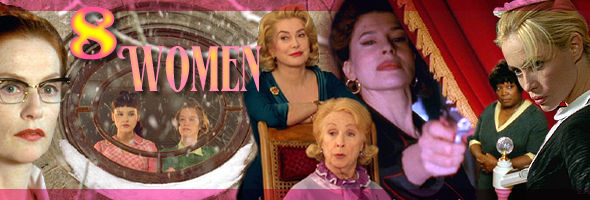

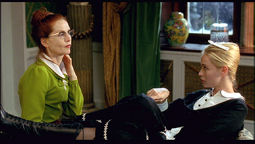 One snowy morning, young Suzon (La cérémonie's Virginie Ledoyen) returns to her isolated family estate for Christmas to join her mother Gaby (Catherine Deneueve), her aunt Augustine (Isabelle Huppert), little sister Catherine (Water Drops on Burning Rocks' Ludivine Sagnier, almost unrecognizable), and her father, who is inconveniently discovered murdered in his bed. With the phone lines cut and the car unable to start, the women find themselves trapped in the house and playing detective. Others in attendance include the wheelchair-bound grandmother (Danielle Darrieux), two secretive maids (Emmanuelle Béart and Firmine Richard), and arriving suspiciously late on the scene, the deceased's black sheep sister, the free-spirited and sultry Pierrette (Fanny Ardant). While not busy puzzling over the crime, each woman pauses for her own musical reverie to express herself, but that's not enough to prevent a string of catfights, lesbian clinches, and dramatic revelations which culminate in a final, tragic twist ending.
One snowy morning, young Suzon (La cérémonie's Virginie Ledoyen) returns to her isolated family estate for Christmas to join her mother Gaby (Catherine Deneueve), her aunt Augustine (Isabelle Huppert), little sister Catherine (Water Drops on Burning Rocks' Ludivine Sagnier, almost unrecognizable), and her father, who is inconveniently discovered murdered in his bed. With the phone lines cut and the car unable to start, the women find themselves trapped in the house and playing detective. Others in attendance include the wheelchair-bound grandmother (Danielle Darrieux), two secretive maids (Emmanuelle Béart and Firmine Richard), and arriving suspiciously late on the scene, the deceased's black sheep sister, the free-spirited and sultry Pierrette (Fanny Ardant). While not busy puzzling over the crime, each woman pauses for her own musical reverie to express herself, but that's not enough to prevent a string of catfights, lesbian clinches, and dramatic revelations which culminate in a final, tragic twist ending.
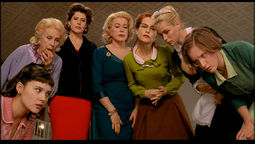 8 Women will be of great amusement to fans of French cinema who rarely get the opportunity to see these legends assembled in the same room, doing what they do best. Huppert has the juiciest role as the repressed, tweed-clothed spinster, who naturally undergoes a crowd-pleasing transformation in the third act. Fortunately each performer gets the spotlight at least once, with the always beguiling Béart performing a saucy rendition of the '80s pop standard, "Pile ou face (Heads or Tails)." In fact, each song originated as a famililar ballad or pop song from the '60s or '70s, which makes this something of a stylistic cousin to Moulin Rouge (and in visual terms, Far from Heaven).
8 Women will be of great amusement to fans of French cinema who rarely get the opportunity to see these legends assembled in the same room, doing what they do best. Huppert has the juiciest role as the repressed, tweed-clothed spinster, who naturally undergoes a crowd-pleasing transformation in the third act. Fortunately each performer gets the spotlight at least once, with the always beguiling Béart performing a saucy rendition of the '80s pop standard, "Pile ou face (Heads or Tails)." In fact, each song originated as a famililar ballad or pop song from the '60s or '70s, which makes this something of a stylistic cousin to Moulin Rouge (and in visual terms, Far from Heaven).
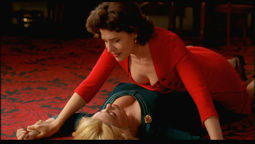 While the American disc from Universal looks top notch and affords the only opportunity to watch the film on DVD with English subtitles, it's depressingly devoid of extras aside from a servicable American trailer. It's a pedestrian package considering the high retail price, and even worse, the large yellow subtitles are burned in; if you want to watch the musical numbers without subs or have a 4:3 set and wish the subtitles were in the lower letterbox band, well, you're out of luck.
While the American disc from Universal looks top notch and affords the only opportunity to watch the film on DVD with English subtitles, it's depressingly devoid of extras aside from a servicable American trailer. It's a pedestrian package considering the high retail price, and even worse, the large yellow subtitles are burned in; if you want to watch the musical numbers without subs or have a 4:3 set and wish the subtitles were in the lower letterbox band, well, you're out of luck.
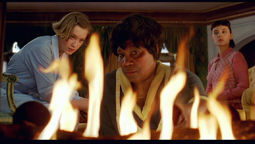 So, that's it for the two-disc set. In the quadruple platter edition (housed in a fuzzy pink and red slipcase, of course), the third disc kicks off with a 130-minute version of the original play recorded onstage and broadcast on French television in 1972. The program's vintage results in a bland and often smeary appearance, but it's interesting to compare the original (non-musical) work to the Ozonified film, which added all of the kittenish (bi)sexuality and camp elements. For French pop nuts there's a terrific selection of six of the song's earlier versions, mostly lifted from French TV programs. For the record, the songs are Françoise Hardy's "Message Personnel," an amazingly kitschy disco version of "A quoi sert de vivre libre" by Nicoletta, Dalida's "Pour ne pas vivre seul," Jane Mason's "Toi Jamais" (excerpted from a film), Georges Brassens' "Il n'y a pas d'amour heureux" (which incidentally was later covered by Hardy, twice!), and the most memorable of the batch, a rousing version of "Pile ou face" by Corinne Charby. The disc is rounded off with a French TV interview with Deneueve, Ardant, and Ozon for a local news program. The fourth disc is the soundtrack CD, which contains all of the songs along with Krishna Lévy's appropriately lush music score.
So, that's it for the two-disc set. In the quadruple platter edition (housed in a fuzzy pink and red slipcase, of course), the third disc kicks off with a 130-minute version of the original play recorded onstage and broadcast on French television in 1972. The program's vintage results in a bland and often smeary appearance, but it's interesting to compare the original (non-musical) work to the Ozonified film, which added all of the kittenish (bi)sexuality and camp elements. For French pop nuts there's a terrific selection of six of the song's earlier versions, mostly lifted from French TV programs. For the record, the songs are Françoise Hardy's "Message Personnel," an amazingly kitschy disco version of "A quoi sert de vivre libre" by Nicoletta, Dalida's "Pour ne pas vivre seul," Jane Mason's "Toi Jamais" (excerpted from a film), Georges Brassens' "Il n'y a pas d'amour heureux" (which incidentally was later covered by Hardy, twice!), and the most memorable of the batch, a rousing version of "Pile ou face" by Corinne Charby. The disc is rounded off with a French TV interview with Deneueve, Ardant, and Ozon for a local news program. The fourth disc is the soundtrack CD, which contains all of the songs along with Krishna Lévy's appropriately lush music score.
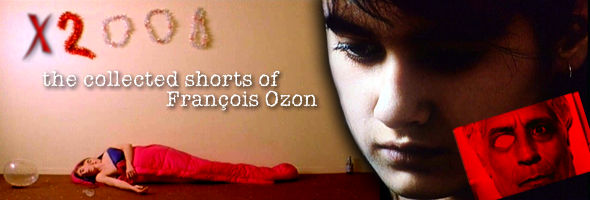
Color, 1994-98, 61 mins. / Directed by François Ozon / Starring Bruno Slagmulder, Sebastien Charles, Margot Abascal, François Delaive, Jacques Martial, Camille Japy
Format: DVD - Kim Stim (MSRP $24.95)/ Letterboxed (1.66:1)
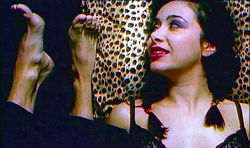 for himself with a series of shocking, unpredictable short films before embarking on a feature film career with 1998's Sitcom, a devilish mixture of grotesque horror, social satire, and John Waters style shock humor. Working at a furious pace, he has since churned out Criminal Lovers (a macabre, sexualized updating of Hansel and Gretel), Water Drops on Burning Rocks (an adaptation of a Fassbinder play), Under the Sand (Charlotte Rampling's 2001 comeback vehicle), and the upcoming 8 Women. For those curious to see where it all started, this collection of four short films offers a good introduction to his work, though the easily offended should approach with caution.
for himself with a series of shocking, unpredictable short films before embarking on a feature film career with 1998's Sitcom, a devilish mixture of grotesque horror, social satire, and John Waters style shock humor. Working at a furious pace, he has since churned out Criminal Lovers (a macabre, sexualized updating of Hansel and Gretel), Water Drops on Burning Rocks (an adaptation of a Fassbinder play), Under the Sand (Charlotte Rampling's 2001 comeback vehicle), and the upcoming 8 Women. For those curious to see where it all started, this collection of four short films offers a good introduction to his work, though the easily offended should approach with caution.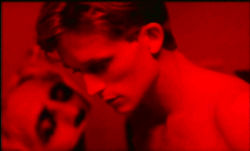 Delaive) who resents his father and passes the time with his lover (Jaques Martial) by collecting pictures of people at the height of orgasm. His sister Camille (Camille Japy) arrives to tell Paul to tell him that their father has died; how he responds and his subsequent discoveries form the crux of the plot, with more than a few twists along the way.
Delaive) who resents his father and passes the time with his lover (Jaques Martial) by collecting pictures of people at the height of orgasm. His sister Camille (Camille Japy) arrives to tell Paul to tell him that their father has died; how he responds and his subsequent discoveries form the crux of the plot, with more than a few twists along the way. 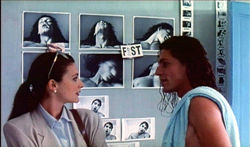 potentially repulsive subject matter with an odd impartiality. Though his visuals are rarely deliberately flashy, he exhibits a keen photographic eye and an ability to use editing and cinematic rhythm to create his own distinct voice as a director. Love him or hate him, there's thankfully no one else around quite like him. Another good collection of his films, See the Sea (containing the title film and "My Summer Dress"), is available from New Yorker, who should really get around to releasing it on DVD along with Sitcom one of these days.
potentially repulsive subject matter with an odd impartiality. Though his visuals are rarely deliberately flashy, he exhibits a keen photographic eye and an ability to use editing and cinematic rhythm to create his own distinct voice as a director. Love him or hate him, there's thankfully no one else around quite like him. Another good collection of his films, See the Sea (containing the title film and "My Summer Dress"), is available from New Yorker, who should really get around to releasing it on DVD along with Sitcom one of these days.